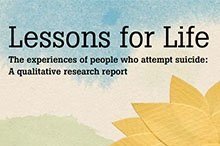
Research
This section is not intended to help suicide survivors in their day-to-day struggles of coming to grips with their attempt.
Instead, it is provided solely for academic interest for those of you who may want to read some of the research being undertaken by institutions and support organisations in suicide survivors. Please note, the links below only represent a very small sample of the research that is being conducted.
Sane Australia
Sane undertook a qualitative study titled “Lessons for Life: The experiences of people who attempt suicide”. The study conducted 31 semi-structured telephone interviews around Australia. The 40-page report lists four main recommendations:
Reduce the stigma of suicide and mental illness
Improve professional services
Provide support to family and friends
Continue qualitative research in this area
MDPI Academic Open Access Publishing
MDIP undertook a qualitative study titled The Attempt Was My Own! Suicide Attempt Survivors Respond to an Australian Community-Based Suicide Exposure Survey
This collaborative study, conducted by academics at three universities in Australia, England and Canada, explores the views of 88 suicide attempt survivors. The findings are presented in three themes:
The way they experienced being suicidal
Who they were able to talk to before and after their suicide attempt
Their experience of the health care supports available to assist with their suicidal crisis
Suicide Prevention Australia
SPA regularly publishes position statements written with a general cross-section of the educated lay public in mind, including the broader community, media, and other NGOs. In a 16-page Position Statement titled Supporting Suicide Attempt Survivors, SPA made a number of recommendations including:
Suicide attempters need to be able to live stigma-free
Prevention strategies need to address the issue of those who do not seek help
There is a need to improve training, education and support for frontline staff to help them recognise and assist people who are experiencing a suicidal crisis
Suicide attempt survivors need to be given better support in the time leading up to a suicide attempt, during the suicidal crisis, and after the event
There is a need to better understand the factors that facilitate recovery after a suicide attempt.
Centre For Suicide Prevention
In an editorial piece titled Suicide Attempt Survivors and the Value of Lived Experience, Robert Olsen points out the importance of using the lived experiences of suicide attempt survivors. This is because they offer unique insights that help improve understanding around the topic of suicide. The 5-page editorial refers to a number of research studies and points out that sharing lived experiences is reducing stigma, enlightening professionals who create policies or study the subject, as well as giving hope to those at risk.
National Action Alliance for Suicide Prevention
The Action Alliance has produced a comprehensive 100-page report focused on survivors of a suicide attempt. Prepared by the Suicide Attempt Survivors Task Force and titled The Way Forward - Pathways to hope, recovery and wellness, with insights from lived experience, a number of recommendations are made that are particularly relevant to attempt survivors. These include:
Attempt survivors should embrace self-help practices such as community involvement, religious/spiritual activity, friends/family support and exercise on their road to recovery
Programs should be developed, evaluated and promoted to help the family and friends of attempt survivors
Medical and behavioural health providers should make suicide prevention a core component of care and integrate assessment and treatment planning into their practices
Providers of crisis or emergency services should develop formal partnerships with organizations offering peer support and which are operated by people with lived experience





